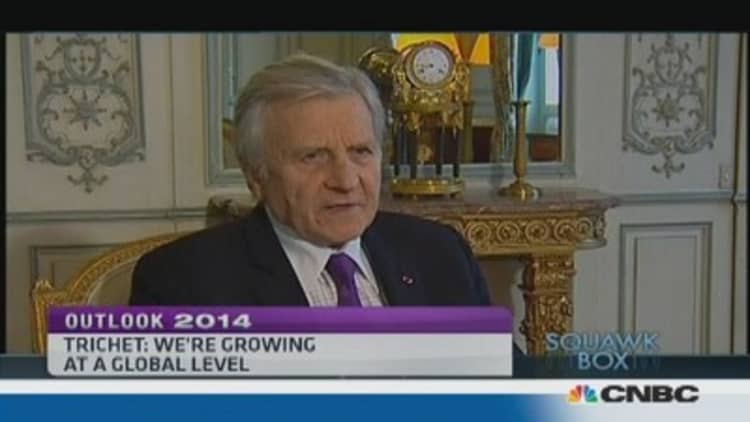
The former head of the European Central Bank told CNBC that global growth is set to pick up in 2014, thanks to central bank policies and austerity measures in the euro zone this year -- as long as structural reforms continued.
"We are clearly now growing at a global level with some good surprises in some advanced economies," Jean-Claude Trichet told CNBC.
"Perhaps [there has been] a slowdown in some emerging economies but we have to look at each economy on the basis of its own fundamentals and I think that, all [things] taken into account, it should be a year of growth."
"I think Europe has done [a lot of hard work] in its adjustment," Trichet, who was president of the ECB from 2003 to 2011 before Mario Draghi took the bank's helm, said.
To restore investor confidence in the euro zone and its shaky "periphery" countries, the region's governments embarked on a harsh round of fiscal consolidation and austerity measures to bring deficits under control.
(Read more: Why euro zone slowdown should worry the world)
However, as austerity measures were introduced in countries such as Greece, Ireland, Portugal, Spain and Italy, they put a brake on economies which sent the euro zone into recession and unemployment to record levels.
"The five countries that were under stress from markets have recovered and they are now more or less balanced when it comes to current account, when they were highly in deficit in 2008 and 2009," Trichet told CNBC.
(Read more: Europe's banking marriage needs 'hard work': Trichet)
"I think that now we will be in positive figures [in terms of growth], it's what all international institutions are projecting - something around 1 percent. It's not brilliant obviously and a lot of structural reforms remain the essence in Europe in order for the growth potential to be much more flattering, but we are now in black figures, it's clear."
Trichet might be confident in the euro zone's recovery but the current growth picture looks less than rosy. In the third quarter of 2013, the annual GDP of the euro zone grew by just 0.1 percent, marking a slowdown from an expansion of 0.3 percent in the second quarter, according to data from Europe's statistics agency Eurostat. The jobless rate, meanwhile, was just off a record high, at 12.1 percent in October.
The wider 28-nation European Union (EU) is not faring much better, with its third quarter GDP rate also at a meagre 0.2 percent quarter on quarter (and just 0.1 percent year on year). Signalling that matters could get worse, ratings agency Standard & Poor's (S&P) cut the EU's long-term credit rating on Friday, to AA plus from AAA, over concerns about "contentious" budget negotiations.
Central bank policy?
Global central bank policy has come in for both praise and criticism over the past year. In the U.S., U.K. and Europe, central banks have had to strike a balance between lowering interest rates to record lows in an attempt to revive moribund economies and preventing runaway inflation.
Trichet said he expected international central banks to be "as respectful of their mandate as required by laws and constitution. As regards the ECB, it has remarkably delivered price stability without deflation and inflation."
Despite Trichet's sanguine appraisal of the ECB, there are concerns over a deflationary trend seen in the 17-nation euro zone.
Euro zone inflation fell to 0.7 percent on year in October – its lowest rate since November 2009 -- prompting the ECB to cut its benchmark rate to a record low of 0.25 percent in early November. In November, the rate had picked up to 0.9 percent from a year ago, according to data agency Eurostat, although the figures still suggest people and businesses are not spending and investing.
Another concern for the ECB remains the impact of the U.S. Federal Reserve's decision to start reining in its bond-buying program in January.
(Read more: IMF will raise US economic growth forecast: Lagarde)
"One cannot expect such extraordinary and very unconventional measures to carry on eternally. I trust that it was very well prepared and pre-announced and I must say, on a personal basis, I was happy that it was announced by Ben [Bernanke, the Fed's president who is set to step down from the role in January]."
- By CNBC's Holly Ellyatt, follow her on Twitter @HollyEllyatt


